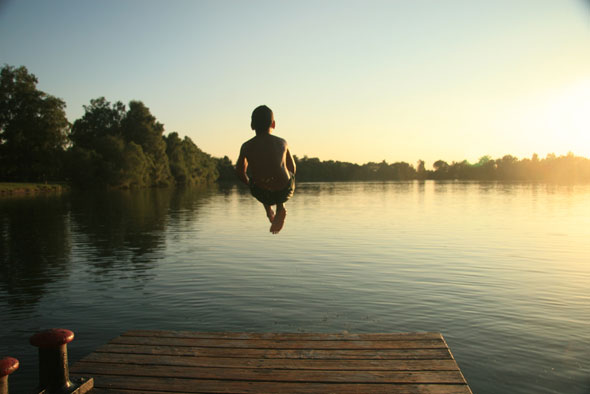
Grandma told me she could fly.
She waited until we were alone in the room to tell me. She was sitting in the chair she liked, the one with the blue fabric and the rip on the arm. I was sitting on the edge of the fireplace, cross-legged, with my chin on my hand.
Grandma stood, and a mischievous grin grew on her lips. Mom called it her “fire grin,” because once Grandma had set fire to the woods behind our house, and when Mom caught her with the matches, Grandma had given Mom that same wild look.
“Did you hear what I said, Charlie?” Grandma asked me. “I said that I can fly.”
I didn’t know what to say.
“Would you like to see?”
“Yes,” I said. Then I said: “No.”
She cocked her head and gave me a look that suggested I was made out of mud.
“I’ll make you a believer,” she said and whirled around in a kind of half-dance.
Our house had these oversized windows with a ledge deep enough to sit on. The windows themselves latched in the middle, and they opened outward like wings. Grandma climbed up on a ledge and hesitated, contemplating the window latch.
“Grandma,” I said. But she paid me no mind. She got the latch undone and with one push she was teetering on the edge, looking down the two-story length of our house, at the grass below. I could feel the cold air seeping into the room, making me shiver.
“Grandma.”
“Do you believe me, Charlie?” she asked. Somehow she looked younger, every line on her face smooth and settled. There was bright energy in her eyes, an eagerness that was only a stone’s throw from seeming childish. “Tell me you do.”
“Yes,” I said.
Grandma nodded. She turned her head up toward the blue sky and closed her eyes. The breeze caught her hair, tossing it back from her forehead. “I just need to remember how. It’s in the memory, Charlie. It’s all in the memory.”
Mom came into the room and she screamed when she saw my grandma standing in the window. Whether Grandma could fly or not, I never found out that day.
****
I was older when she told me about the lake.
“You ever lie underneath the sky and watch the clouds?” Grandma asked me. It was late afternoon and we were sitting on the back porch. My dad was trying to get the barbeque lit and having a bugger of a time.
“I suppose,” I said. I leaned back in my chair, laced my hands in my lap, and looked up at the sky. There were no clouds, and the atmosphere was so blue it was hard to believe there was anything beyond that color. No stars. No moon. Nothing.
“Well either you did or you didn’t,” Grandma said. She had her hand wrapped around a glass of lemonade. When she lifted it to her lips the ice clinked against the glass and she made a smacking noise that grossed me out. “There’s magic in those clouds, Charlie, for anyone willing to look hard enough. There’s magic everywhere. But you’ve got to listen for it. Magic whispers; it doesn’t shout.”
I had no idea what Grandma was talking about. I usually didn’t.
“When you look up into the sky,” she said, “what do you see?”
I shrugged. “No clouds.”
“No clouds today, Charlie, but what about yesterday? Or the day before?”
I shrugged again. I couldn’t even remember if I had cereal that morning for breakfast.
“You lack imagination, Charlie. You always did.” She took another drink of lemonade. “Not your fault,” she said, wagging a finger at me.
“I guess.”
My dad was now on his back, underneath the barbecue messing with the igniter wiring, and I watched him so I didn’t have to look at Grandma.
“The lake,” she said. “That’s where I first found it. Heard it. A voice calling out to me.” I felt her gaze on me, heavy and longing, like a puppy from behind a window. “That’s when I first learned how to fly, Charlie. At the lake.”
I was too old now to believe the story. When I was a little boy her stories mystified me. As I grew older they just bored me.
“I was only a little girl. We were poor, and we were about to lose the house. I was sitting by the lake, pouting, because I didn’t want to leave. You can understand that.”
I nodded.
“The water was so still, and the air. The air was so clean! I could hear everything. The crickets and the loons with their god-awful cry. That sound could haunt the freckles off your back, Charlie. I swear it could. Even the earth underneath me seemed to groan with words that weren’t really words at all.”
“What did you hear?” She was sucking me in again.
“Footsteps. Coming up behind me. But there was nobody there.” She took another sip of her lemonade, and when she set her glass down on the table I noticed her hand was trembling. “I turned around and there was nobody there. But something whispered to me, right into my ear. A woman’s voice, or maybe a little girl’s, soft as kitten breathe.”
I checked on my dad, who was still holding his vigil underneath the barbecue. His tongue was poking out of the corner of his mouth, a sign things were getting serious.
“You can fly if you want to,” Grandma said. “That’s what I heard. That’s what the voice said to me.”
“Did you see the woman?” I asked.
“I turned back toward the lake as if the voice had come from the water itself. Maybe it did; I don’t know. I still don’t know. I saw my reflection there, only it wasn’t my reflection, Charlie.”
“No?”
“It was another little girl looking back at me. And this little girl was in the air. She was flying, and she was laughing, and she was looking back at me with eyes as big as silver dollars. You know what I saw in those big eyes? I saw the future. I saw all the possibilities of what can be, and what might be, and it made me cry.”
“Did you fly?”
“I ran away screaming.” She sat back and smiled. “I was only a little girl, and Daddy came out with a shotgun, thinking I saw someone creeping around in the bushes.” She giggled at this memory as she tenderly put a hand to her cheek. “But I did fly, Charlie. I did, later, and it was wonderful. I can teach you how, but you have to believe. You have to want to do it.”
A crash and a yell disrupted our conversation. I heard my dad curse loud enough to spook a pair of jays from the fence. The barbecue had flipped over on its side, and the grate rolling across the concrete did a kind of lazy wobble and then fell against my mom’s pot of petunias. Dad reared back his arm and chucked the lighter. It landed in the rose bush.
“Shit on a stick!” he yelled, and Grandma belted out a bray of laughter spraying lemonade everywhere.
****
I lay in bed most of the night thinking about what Grandma told me. By morning, I had decided to ask her about flying again.
But the lights were off in the living room, and in the kitchen, and I knew that was wrong. For as long as I could remember, Grandma was always the first up, the first to have coffee made and the first to be at the table drinking it.
But that morning there was no sign of her.
“Grandma?”
Her room was at the end of the downstairs hallway. I crept there in my socks, despair gnawing at my ribs. I hesitated at her door, almost knocked, but leaned in to listen instead. From inside I could hear Grandma’s fan whooshing back and forth, but nothing else.
“Grandma?”
The door opened, and there she was, staring at me as if she had never seen me before. Her face was slack, not with sleep, but waxen like a doll’s. Her skin was glossy and there was dried spit on her lips.
“Grandma?”
She blinked, once and then again, and then her lower lip dropped open as if she were about to speak. But only the faintest of sounds came out of her mouth.
“Wake up,” I said. “It’s me. It’s Charlie.”
Her eyes darted down to the floor and then back to my face. She smacked her lips and drool fell down her chin and to the floor in one long stringy drop.
“Don’t touch the pastries, Jack,” she said. “The fire department’s at the door!”
I took another step backward until I was against the wall.
“Get away from the toaster! It’s hot! It’s hot!”
“Grandma!”
Her eyes rolled up until they were white. Her lips and her hands trembled. And then she blinked. When she opened her eyes again, I saw clarity there for the first time.
“Charlie,” she said. “What on earth are you doing in the hallway at this hour?”
“It’s morning,” I said.
She ran a hand across her face and yawned. “So it is, Charlie. So it is.” She put a hand on my arm. “You look like you’ve seen a ghost.”
“I was worried,” I said.
“What on earth for?”
“I don’t know.”
She ruffled my hair and then set off down the hall. “You were always a little odd, Charlie,” she said and turned the corner.
****
Two weeks later, she fell and broke her hip. Mom told me she had climbed up onto the fence in the backyard, and fell into the neighbor’s hydrangeas.
“I don’t know what in the world she was doing,” my mom said. “Climbing up there like that. I think she’s going mad.”
But I knew. Grandma was trying to remember how to fly.
****
When Grandma came home from the hospital, she was restricted to a wheelchair. This was like clipping the wings of a sparrow. The medicine made her thick and distant, and she barely said a word to any of us anymore. Sometimes she would just sit and stare and I would wonder if she hated us. Maybe she blamed us for the chair, or maybe it was the fall. I think falling was the hardest part of it all. It was more than her hip that shattered that day.
I missed her, missed hearing her voice and her laugh. I even missed her stories.
One bright morning in late August, I pushed Grandma outside to sit with me on the patio. The day was already edging toward being another scorcher, and I was starting to sweat while Grandma sat there with her yellow afghan draped over her lap.
“Show me how to fly, Grandma,” I whispered. I locked her wheels in place and sat down in the chair next to her.
Her eyes were cold and hard. Her gnarled hands clutched at the afghan.
“Look, Grandma. Look at the clouds. Big puffy ones, just like you like.” I patted her hand. “There’s one that looks like a boat. Like a tugboat.”
I was speaking to her as if she were 5 years old, a horrible thing people tend to do with the elderly and the sick. But I was 14 years old, and I just wanted my grandma back.
“Talk to me, Grandma. Just say something.”
Desperation filled me like water. I stood, biting back the anger, and went into the house, leaving Grandma there on the porch. I pulled open the cabinet over the sink and snatched a glass, but I dropped it when I heard something crash outside. Underneath the sound of metal on concrete was a low, hoarse moan.
I ran outside and found the wheel chair flipped on its side. Grandma lay with her cheek pressed to the concrete, her frail body crumpled in a motionless heap. Her eyes were wet and wide and staring up at me. Her face was a pond of emotion, its surface frozen solid.
“Grandma,” I said, kneeling and brushing the hair out of her face. “What did you do?”
Her legs were twisted wrong. She must have been in pain, but she didn’t show it.
“What do I do?”
Her lips began to move, to tremble, to vibrate. She reached for my arm and grabbed me fiercely with one hand.
“Kill me,” she whispered. “Kill me, Charlie. Please.”
****
Grandma taught me how to swim by pushing me into the deep end of the municipal pool and holding my head under water until I learned not to open my mouth. I’m pretty sure I was as close to drowning that afternoon as a kid could be, and I’m equally convinced that Grandma would have let me if I didn’t give in to her. I still remember what it felt like to be underneath all that water and to have no control. That’s how I felt the last time I went to see Grandma in the hospital.
She lay in her bed, motionless, so still that she appeared artificial. Like a husk or a shell of something that was no longer present. Her wrinkled skin was sallow and thin. Her eyes, almost lifeless.
Mom put her hand on my arm and I almost screamed.
There was little light coming through the blinds and as I approached her bed I could see dust floating in the air, could feel them collecting on my skin, like a thousand tiny fingers. I wanted to run away, but stood frozen as her heavily sedated eyes rolled toward me.
“Charlie,” she whispered, her lips like leather, colorless and worn.
I put my hand on the bedrail; felt the cold steel against my skin.
“Charlie,” Grandma said again, and she tried to smile but could only hold it for a fraction of a moment. “Come here.”
She lifted her hand and twitched her fingers. I put my hand in hers and tried not to show in my expression how horrible it felt to touch her. Touching her was worse than touching that cold bedrail, because it was like clutching death itself. She was so frail I worried that she would crumble and blow away, right out of my palm, just like a memory or a whispered word on the breeze.
I looked up at my mom and saw tears in her eyes.
“I’m here, Grandma,” I said. My voice sounded too loud in the haunting silence that surrounded us.
“Do you still remember how to fly, Charlie?”
I shook my head. “I don’t know how.”
“We all know how to fly,” Grandma said. “We just need to remember. That’s all.”
The nurse came in and took Grandma’s vitals. Grandma closed her eyes and fell asleep, and she never woke up again.
****
What we remember the most from our childhood are often the strange things. These become sacred somehow, and so we hold on to them. They haunt us, like ghosts. They move us, still, when we allow them to, like old melodies. In the same way, Grandma still speaks to me. She was my friend, and even in her madness she was a part of me that will always hum, like a live wire. Dangerous and beautiful.
I go out to the lake often now to sit in the grass and I’ll look up at the sky to watch the clouds. Sometimes they make shapes, and I’ll watch them shift and reform, and I’ll remember what Grandma used to tell me, about water, about the sky, and about life. When I look at myself in the still mirror of the water, I see a strange face staring back at me. It’s my own face, but younger, perhaps it belongs to the boy I used to be, or the boy I had always wanted to be. Once I saw that boy holding onto a red balloon by its long string. The balloon drifted and bopped, and I’m pretty sure that boy was flying.
Today, the clouds are like cotton balls, and they cast shadows that move slowly over the fields. The lake is still and there is no wind. I’ve taken off my shoes and rolled up my pant legs, and I’m about to get into the water. I’m a great swimmer now. I owe that, and many other things, to Grandma. But I think that I should like to see if I can walk on the water this time. I’ll pretend that it’s made of glass and that I am as light as a feather. Afterward, I think I’ll climb a tree. I can fly, just like the little boy in the reflection on the lake, and just like my grandma. It only took all these years to finally believe, but I do. I really do.
Become a Saturday Evening Post member and enjoy unlimited access. Subscribe now
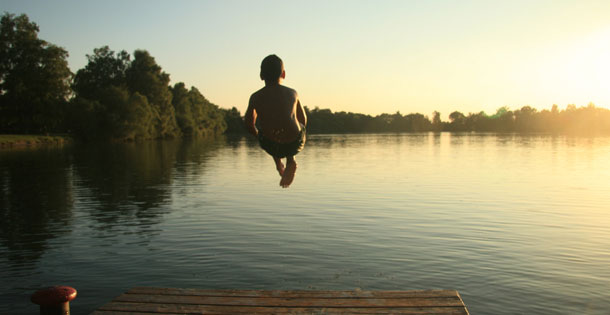
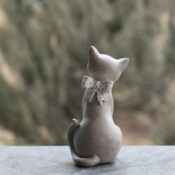
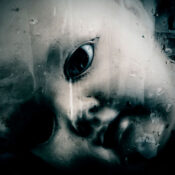
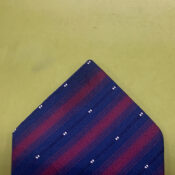
Comments
Enjoyed this short story, it has brought back so many memories of my grandmother. Thanks Sean Ealy!